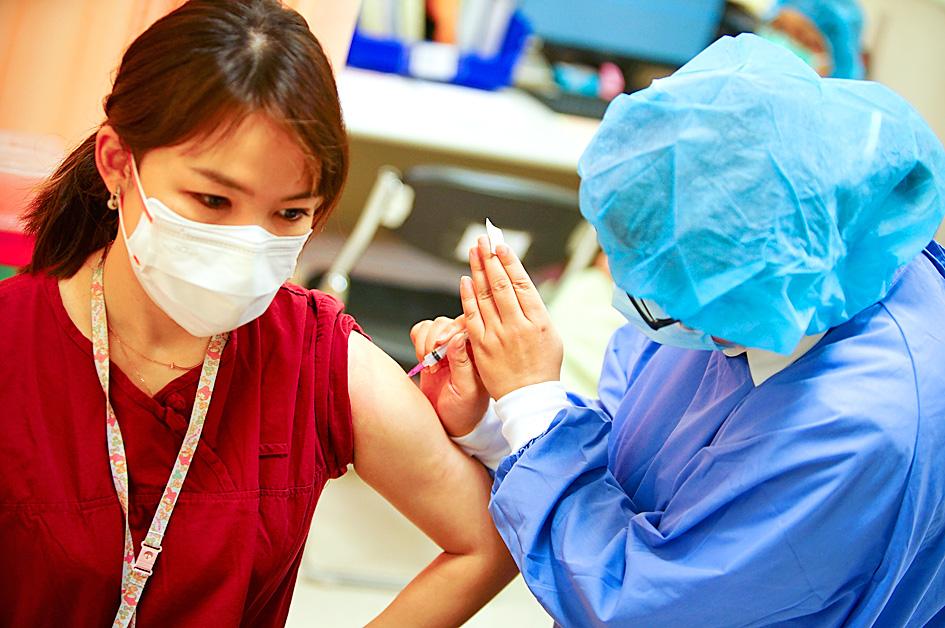The Central Epidemic Command Center (CECC) yesterday reported 167 cases of domestic COVID-19 infection and 18 deaths.
Minister of Health and Welfare Chen Shih-chung (陳時中), who heads the center, said the local cases were 85 males and 82 females, from younger than five to older than 90, who began experiencing symptoms between June 1 and Tuesday.
New Taipei City had the highest number of cases at 65, followed by Taipei with 50 cases, Miaoli County with 21, Taoyuan with 14, Hualien County with eight, Hsinchu County with five, Keelung with two, and Taichung and Kaohsiung with one each.

Photo: CNA
In the 52 cases reported outside of Taipei and New Taipei City, the infection sources of 48 cases have been identified, while four remain unclear, Chen said at the CECC’s daily news briefing.
The 18 deaths are nine men and nine women who were in their 30s to 90s and had underlying health conditions, CECC data showed.
“The local COVID-19 situation is trending downward,” Chen said.
While the situation is stabilizing in Taipei and New Taipei City, it is important to quickly identify and isolate close contacts of infected people as soon as possible through precision contact tracing, he said.
Expanded testing is also necessary to find asymptomatic carriers, he said, urging people identified as close contacts of confirmed cases to cooperate and undergo COVID-19 testing to protect themselves, their family and the community.
Asked about the possibility of lowering the nationwide level 3 COVID-19 alert to level 2, or even “level 2.5” as some public health experts have suggested, to revive parts of the economy, Chen said that the CECC “humbly listens to all advice,” but the COVID-19 situation is “just stabilizing, not slowing down” and case counts could quickly spike if caution is not observed.
Whether to loosen restrictions must be planned carefully, as reopening parts of the economy might trigger a chain reaction and break the line of defense against COVID-19, he added.
“The coronavirus knows no national borders, let alone county borders,” Chen said. “The virus could be anywhere, and no one wants to become infected, or wants to transmit the virus to other people, so everyone on this island shares the same fate and we should all come together to fight it.”
Asked if Taiwan has a lower cycle threshold (CT) value standard for diagnosing COVID-19, Centers for Disease Control (CDC) Deputy Director-General Philip Lo (羅一鈞), deputy head of the CECC’s medical response division, said that this is a common misconception.
Taiwan does not use a CT value of 35 or higher as the only standard to diagnose someone with COVID-19, as those whose CT values reach 38 or even 41 are also considered to be infected, he said.
The standard for discharging COVID-19 patients from hospitals or centralized quarantine facilities was recently revised to a CT value of 30 or higher, as studies show that they are hardly contagious, and this would give hospitals and quarantine facilities more room for patients who are seriously ill with the virus, he said.
Patients with a CT value of 30 or higher who are released from isolation may still be moved to a general hospital room, depending on their doctor’s advice, he added.

TRUST: The KMT said it respected the US’ timing and considerations, and hoped it would continue to honor its commitments to helping Taiwan bolster its defenses and deterrence US President Donald Trump is delaying a multibillion-dollar arms sale to Taiwan to ensure his visit to Beijing is successful, a New York Times report said. The weapons sales package has stalled in the US Department of State, the report said, citing US officials it did not identify. The White House has told agencies not to push forward ahead of Trump’s meeting with Chinese President Xi Jinping (習近平), it said. The two last month held a phone call to discuss trade and geopolitical flashpoints ahead of the summit. Xi raised the Taiwan issue and urged the US to handle arms sales to

A magnitude 5.6 earthquake struck off the coast of Yilan County at 12:37pm today, with clear shaking felt across much of northern Taiwan. There were no immediate reports of damage. The epicenter of the quake was 16.9km east-southeast of Yilan County Hall offshore at a depth of 66.8km, Central Weather Administration (CWA) data showed. The maximum intensity registered at a 4 in Yilan County’s Nanao Township (南澳) on Taiwan’s seven-tier scale. Other parts of Yilan, as well as certain areas of Hualien County, Taipei, New Taipei City, Taoyuan, Hsinchu County, Taichung and Miaoli County, recorded intensities of 3. Residents of Yilan County and Taipei received

Taiwan has secured another breakthrough in fruit exports, with jujubes, dragon fruit and lychees approved for shipment to the EU, the Ministry of Agriculture said yesterday. The Animal and Plant Health Inspection Agency on Thursday received formal notification of the approval from the EU, the ministry said, adding that the decision was expected to expand Taiwanese fruit producers’ access to high-end European markets. Taiwan exported 126 tonnes of lychees last year, valued at US$1.48 million, with Japan accounting for 102 tonnes. Other export destinations included New Zealand, Hong Kong, the US and Australia, ministry data showed. Jujube exports totaled 103 tonnes, valued at

BIG SPENDERS: Foreign investors bought the most Taiwan equities since 2005, signaling confidence that an AI boom would continue to benefit chipmakers Taiwan Semiconductor Manufacturing Co’s (TSMC, 台積電) market capitalization swelled to US$2 trillion for the first time following a 4.25 percent rally in its American depositary receipts (ADR) overnight, putting the world’s biggest contract chipmaker sixth on the list of the world’s biggest companies by market capitalization, just behind Amazon.com Inc. The site CompaniesMarketcap.com ranked TSMC ahead of Saudi Aramco and Meta Platforms Inc. The Taiwanese company’s ADRs on Tuesday surged to US$385.75 on the New York Stock Exchange, as strong demand for artificial intelligence (AI) applications led to chip supply constraints and boost revenue growth to record-breaking levels. Each TSMC ADR represents